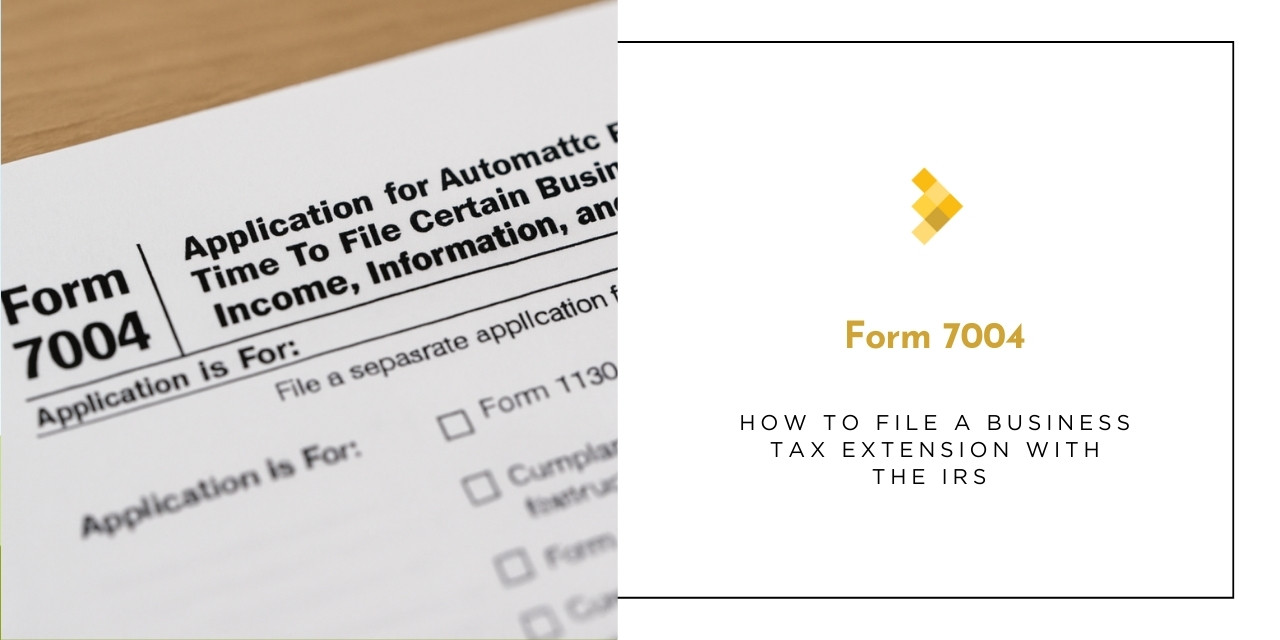Ever wished for extra time during tax season? That’s exactly what Form 7004 gives you. When financial records aren’t finalized or returns require additional review, this extension gives businesses the breathing room they need to avoid costly penalties and unnecessary stress.
In this guide, we’ll walk you through how the 7004 Form works, the steps to file it correctly, the common business tax forms it applies to, and the key points every business should monitor along the way.
What is Form 7004?
Form 7004, officially known as the Application for Automatic Extension of Time to File Certain Business Income Tax, Information, and Other Returns, grants businesses an automatic extension to submit their return without penalties for late filing. It typically grants a six-month extension, though estates (other than bankruptcy estates) and trusts filing Form 1041 are limited to an automatic 5½-month extension from the original due date. More details are available on the IRS page for Form 7004.
It is important to note:
• Extension applies only to filing – Tax liability must still be settled by the regular due date
• Automatic filing – A Form 7004 extension is automatic once properly submitted, with no explanation or justification required
• Penalties for errors – Filing incorrectly or missing the submission deadline can still lead to penalties
Key Business Tax Forms Covered
To file Form 7004 correctly, you need to know which tax forms it covers:
• Form 1120 (U.S. Corporation Income Tax Return) – C corporations use this form to report income, deductions, credits, and other details to calculate federal tax liability.
• Form 1120-C (U.S. Income Tax Return for Cooperative Associations) – Cooperative associations, such as farmer co-ops, use this return to report income and claim deductions specific to cooperative structures.
• Form 1120S (U.S. Income Tax Return for an S Corporation) – S corporations report income, gains, losses, deductions, and credits here; results then pass through to shareholders’ personal returns.
• Form 1065 (U.S. Return of Partnership Income) – Partnerships (including most multi-member LLCs) use this to report income, deductions, and losses. Income passes through to partners for personal reporting.
• Form 1041 (U.S. Income Tax Return for Estates and Trusts) – Estates and trusts file this to report income, deductions, and distributions, and to determine tax liability on income generated.
• Form 1042 (Annual Withholding Tax Return for U.S. Source Income of Foreign Persons) – Withholding agents file this to report U.S.-source income (dividends, interest, royalties) paid to foreign persons and the taxes withheld.
Understanding which return applies to your business ensures you complete the 7004 Form with the correct code and information.
Who Can File Form 7004?
Entities that are generally required to file Form 7004 include:
• Partnerships and LLCs filing Form 1065
• C Corporations filing Form 1120
• S Corporations filing Form 1120-S
• Cooperative Associations filing Form 1120-C
• Certain trusts and estates required to file Form 1041
• Other entities listed in the IRS instructions for Form 7004
Deadlines to Remember
The due date to submit the 7004 Form depends on the type of return:
• Partnerships and S Corporations (Forms 1065, 1120-S): For calendar-year taxpayers, the original deadline is March 15. Filing Form 7004 grants a six-month extension, typically moving the due date to September 15.
• C Corporations (Form 1120): For calendar-year corporations, the deadline is April 15. Filing Form 7004 extends it to October 15. For fiscal-year corporations, the deadline is the 15th day of the fourth month after year-end, with a six-month extension from that date.
Example: If a corporation’s fiscal year ends on June 30, the original deadline is October 15, and the extended deadline (with Form 7004) is April 15 of the following year.
• Cooperative Associations (Form 1120-C): These follow the same deadlines as C corporations, i.e., April15. By filing Form 7004, corporations can extend their return deadline to October 15.
• Trusts and Estates (Form 1041): Calendar-year taxpayers are required to file their returns by April 15. Filing Form 7004 grants a 5½-month extension, moving it to September 30.
Form 7004 grants an extension as long as it is filed on time. For example, partnerships filing Form 1065 by March 15 can extend their deadline to September 15. To do so, they must file Form 7004 before the original due date.
Step-by-Step Process to File Form 7004
Step 1: Confirm Your Eligibility
Review the IRS instructions to ensure your business return is covered. The majority of corporations, partnerships, and trusts are eligible to file 7004 Form.
Step 2: Gather Required Information
To complete the form, you will need:
• Business name, EIN, and legal address (as shown on IRS records)
• Tax form code of the return you’re extending
• The estimated total tax liability for the year
• Payments already made, if any
• Final balance of tax you need to pay
Step 3: Estimate Your Tax Liability
Even though the 7004 Form grants extra time, you must make a reasonable estimate of your tax liability. Unpaid taxes beyond the original due date can lead to penalties and interest.
Step 4: Complete Form 7004
The form is short but requires accuracy. You’ll need to:
• Enter the appropriate return code as listed in the IRS Form
• Fill in business details
• Report estimated liability and payments
• Calculate any tax still due after payments
Step 5: Submit Your Payment (If Needed)
If tax is owed, submit payment with the 7004 Form using:
• Electronic Federal Tax Payment System (EFTPS)
• IRS Direct Pay
• Pay by mail – include a check or money order with your submission
Step 6: File the Form
The IRS allows you to file Form 7004 electronically through approved providers (recommended) or by mailing it to the appropriate address. Knowing where to file Form 7004 is important, as mailing it to the wrong office can cause delays. No signature is required if you file electronically, but paper submissions must be signed by an officer, partner, fiduciary, or other authorized individual.
Step 7: Keep Confirmation Records
Keep your e-file receipt or mailing proof for Form 7004, since the IRS may ask for documentation.
Common Mistakes to Avoid
Here are some of the most frequent mistakes made while filing Form 7004:
• Confusing filing extensions with payment extensions
• Submitting the form after the deadline
• Using the wrong return code
• Estimating zero liability without cause
• Not keeping proof of filing
Key Points Businesses Should Keep a Check On
• Cash Flow – Ensure funds are available to cover tax due by the original deadline
• Internal Coordination – Work with your accounting team well in advance
• Multiple Entities – Each business entity must file a separate 7004 Form
• State Extensions – Federal extensions don’t always cover state-level returns
• IRS Updates – Deadlines can shift due to holidays or IRS policy changes
• State Extensions – Filing Form 7004 alone is not enough; you also need to confirm whether your state requires a separate extension form or if it automatically accepts the federal extension
Final Thoughts
Form 7004 provides businesses additional time to close their books, plan deductions carefully, and issue accurate K-1s to shareholders or partners without unnecessary rush. Filing it on time protects your company from penalties and helps keep financial records clean and compliant. If you anticipate delays, submit the extension early so tax season stays stress-free and under control.
Don’t wait until the last minute. File your Form 7004 on time and make tax season stress-free. Book your free consultation today to recieve expert guidance customized to your needs.






10 Comments
PIYUSH JHA
Very well explained!!
Vimal Sharma
Appreciate your feedback.
Ritika Sharma
Very Informative
Harneet
Knowledgeable!
Ritu
Fantastic post! Very helpful
Vimal Sharma
Thanks for reading!
RAMAN KUMAR
Knowledgeable
Vimal Sharma
thanks for your feedback.
Neeraj Kumar
Very Informative thanks fir sharing
Pranshu
Informative